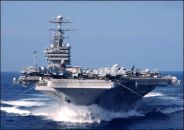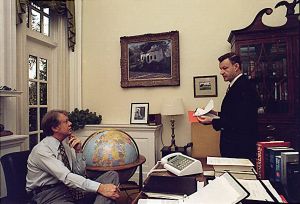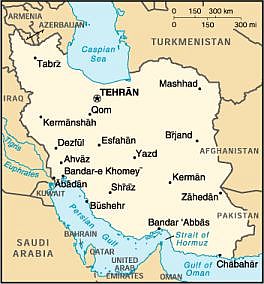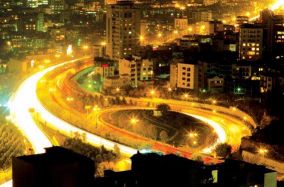
|
NEDERLANDS | ENGLISH
|
|
|
12 februari 2007
|
 mail dit artikel
| mail dit artikel
|
 print
| print
|  
Dit artikel is deel van de serie: De komende oorlog tegen Iran
[ 1 - 2 - 3 - 4 - 5 - 6 - 7 - 8 - 9 - 10 - 11 - 12 - 13 - 14 - 15 - 16 - 17 - 18 - 19 - 20 - 21 - 22 - 23 - 24 - 25 - 26 - 27 - 28 - 29 - 30 - 31 - 32 - 33 - 34 - 35 - 36 - 37 - 38 - 39 - 40 - 41 - 42 - 43 - 44 - 45 ]
De komende oorlog tegen Iran - Deel 15
Door Daan de Wit
Straffe taal en ernstige beschuldigingen onderstrepen de militaire opbouw; de VS maken zich klaar om een volgend land aan te vallen: Iran. Met iedere dag die voorbij gaat, komt een oorlog met Iran dichterbij. De betrokken partijen graven zich steeds dieper in. Het is een oorlog die vanaf het begin onvermijdelijk leek. Niemand wil het, op een enkeling na. De geschiedenis zal leren of deze kleine groep krijgt waarop zij zich richten. Straffe taal en militaire acties VS deel opbouw Iranoorlog 'John Hannah, Vice President Cheney's national security adviser, said during a recent meeting that the administration considers 2007 "the year of Iran" and indicated that a U.S. attack was a real possibility', schrijft The Washington Post. The Guardian schrijft: 'The present military build-up in the Gulf would allow the US to mount an attack by the spring. But the sources said that if there was an attack, it was more likely next year, just before Mr Bush leaves office.' Oorlogsjournalist John Pilger schrijft: 'The United States is planning what will be a catastrophic attack on Iran. [...] I wrote virtually this same article early in 2003; for Iran now read Iraq then.' Ayatollah Ali Khamenei dreigt de VS in het geval van een aanval en Iran stelt een schaduwbegroting op: '"We are preparing a shadow budget based on the oil price of under $30 per barrel in case an extraordinary incident happens on the international arena"'. Mogelijk vooruitlopend gevolgen voor de wereldoliemarkt van een aanval op Iran hebben de VS aangekondigd de Strategische Energievoorraad te gaan aanvullen: 'the US Energy Department announced on Jan 23rd, a new push in the spring to fill the Strategic Petroleum Reserve with initial purchases of 11 million barrels. “In the spring, that is to say about two months from now, we will begin the fill.' De Sunday Telegraph schrijft: 'The build-up of anti-Iran rhetoric and despatch of two US aircraft carriers to the region has echoes for some of the run-up to the invasion of Iraq, prompting suspicions about the intentions of the remaining hawks within the administration, led by the vice-president, Dick Cheney.' Le Figaro schrijft eind januari: 'With the sending of the  aircraft carrier USS John C. Stennis and its combat group to join the Dwight D. Eisenhower, already in the Gulf, the United States now has the ability to conduct an air offensive 24 hours a day for 30 or 40 days. It can rely on Bahrain, the huge al-Udaid airbase in Qatar and its operational command centre, and the Diego Garcia base in the Indian Ocean for supply. The American satellites have reportedly identified 1,500 targets linked to the Iranian nuclear weapon programme, distributed over 18 main sites. [...]'. 'Newsweek has learned that a third carrier will likely follow'; mogelijk gaat het om de USS Ronald Reagan die zich heeft gevoegd in het gebied waar de USS Stennis al was als waarschuwing voor Syrië en Iran. Een ander belangrijk teken aan de wand komt van insider Brzezinski die rekening houdt met het ergste en een ernstige waarschuwing doet. aircraft carrier USS John C. Stennis and its combat group to join the Dwight D. Eisenhower, already in the Gulf, the United States now has the ability to conduct an air offensive 24 hours a day for 30 or 40 days. It can rely on Bahrain, the huge al-Udaid airbase in Qatar and its operational command centre, and the Diego Garcia base in the Indian Ocean for supply. The American satellites have reportedly identified 1,500 targets linked to the Iranian nuclear weapon programme, distributed over 18 main sites. [...]'. 'Newsweek has learned that a third carrier will likely follow'; mogelijk gaat het om de USS Ronald Reagan die zich heeft gevoegd in het gebied waar de USS Stennis al was als waarschuwing voor Syrië en Iran. Een ander belangrijk teken aan de wand komt van insider Brzezinski die rekening houdt met het ergste en een ernstige waarschuwing doet. Brzezinski houdt rekening met false flag operation Zbigniew Brzezinski, voormalig veiligheidsadviseur voor president Carter, waarschuwt in een getuigenis voor een Amerikaanse Senaatscommissie dat de VS aan de vooravond staan van een oorlog met Iran, mogelijk geprovoceerd middels een false flag operatie waarbij een aanval op Amerika in de schoenen van Iran zal worden geschoven: 'If the United States continues to be bogged down in a protracted bloody involvement in Iraq, the final destination on this downhill track is likely to be a head-on conflict with Iran and with much of the world of Islam at large. A plausible scenario for a military collision with Iran involves Iraqi failure to meet the benchmarks; followed by accusations of Iranian responsibility for the failure; then by some provocation in Iraq or a terrorist act in the U.S. blamed on Iran; culminating in a “defensive” U.S. military action against Iran that plunges a lonely America into a spreading and deepening quagmire eventually ranging across Iraq, Iran, Afghanistan, and Pakistan.' Brzezinski weet waarover hij spreekt. Hij was het die in de jaren zeventig de Sovjet-Unie liet trappen in de 'Afghaanse val' die hij had gelegd. Als gevolg van het steunen door de VS van de Mujahedeen werden de Sovjets verleid Afghanistan binnen te vallen: 'The day that the  Soviets officially crossed the border, I wrote to President Carter: We now have the opportunity of giving to the USSR its Vietnam war.' Het is nu de visie in Washington dat het deze Islamitische fundamentalisten (waaronder Bin laden en de Taliban) zijn die zich uiteindeijk hebben gekeerd tegen de VS. Zonder hierop al te diep in te gaan, is het maar helemaal de vraag in welke mate dit inderdaad zo is en hoe succesvol zij zijn. Het is immers onbewezen dat de aanslagen op 9/11 inderdaad werden uitgevoerd in opdracht van Osama bin Laden, terwijl er vergaande bewijsvoering is dat de VS de aanval zelf hebben georganiseerd en uitgevoerd. Hetzelfde scenario lijkt ook te zijn toegepast tijdens de aanslagen op 7/7 in Londen. Soviets officially crossed the border, I wrote to President Carter: We now have the opportunity of giving to the USSR its Vietnam war.' Het is nu de visie in Washington dat het deze Islamitische fundamentalisten (waaronder Bin laden en de Taliban) zijn die zich uiteindeijk hebben gekeerd tegen de VS. Zonder hierop al te diep in te gaan, is het maar helemaal de vraag in welke mate dit inderdaad zo is en hoe succesvol zij zijn. Het is immers onbewezen dat de aanslagen op 9/11 inderdaad werden uitgevoerd in opdracht van Osama bin Laden, terwijl er vergaande bewijsvoering is dat de VS de aanval zelf hebben georganiseerd en uitgevoerd. Hetzelfde scenario lijkt ook te zijn toegepast tijdens de aanslagen op 7/7 in Londen.Brzezinksi weet van binnen uit hoe in tijden van conflicten alle mogelijke middelen worden ingezet om het doel te bereiken. Hij beschrijft in zijn getuigenis voor de Senaat de leugen en het bedrog in aanloop naar de Irakoorlog en waarschuwt alert te zijn voor de subversieve middelen die nu kunnen worden ingezet teneinde een nieuwe oorlog te forceren, ditmaal tegen Iran. De tekenen aan de wand dat deze oorlog realiteit wordt, zijn er al sinds deel 1 van deze Iran-serie van DeepJournal. Het is opmerkelijk dat een insider als Brzezinski zo'n vergaande inkijk biedt op het niveau waarop dit soort belangrijke zaken wordt besloten en georkestreerd. Het is een alarmerend signaal. Het is niet alleen grotendeels gemist door de Nederlandse pers, maar ook door de Amerikaanse. Een kwalijke zaak omdat het de agendasetting van de massamedia is die voor een belangrijk deel bepaalt wat relevant wordt geacht of niet en onze volksvertegenwoordiging aanspoort tot actie. Zonder de aanzwengelende functie van de grote media blijft dit soort essentiële waarschuwingen grotendeels ongehoord en zullen de afgevaardigden in het parlement achter de waan van de dag aan blijven lopen (zie [RealPlayer] over dit onderwerp ook de Zembla-reportage Haagse Herrie). Over hoe een oorlog met Iran kan ontstaan, zegt Brzezinski tegen de Senaatsleden: 'It could even be in some fashion provoked'. En: 'If one is of the view that one is dealing with an implacable enemy that has to be removed, that course of action may under certain circumstances be appealing. I'm afraid that if this situation in Iraq continues to deteriorate, and if Iran is perceived as in some fashion involved or responsible, or a potential beneficiary thereof, that temptation could arise'. De verleiding waarop hij doelt, is het provoceren van de vijand teneinde een geplande oorlog te forceren. Om dit Iran-scenario te illustreren, citeert hij een krantenartikel dat bericht over de aanloop naar de Irakoorlog: '“I'll just read you what this memo allegedly says, according to the New York Times: ‘The memo states that the president and the prime minister acknowledged that no unconventional weapons had been found inside Iraq [this is two months before the war]. Faced with the possibility of not finding any before the planned invasion, Mr. Bush talked about several ways to provoke a confrontation.' Amerika provoceert Iran teneinde oorlog te forceren Een zo'n provokatie was mogelijk de recente ontvoering van de Iraanse diplomaat Jalal Sharafi door 'four Iraqis, who wore military uniforms and carried military identification cards, [they] were "not under the Ministry of Defense control, they were directly connected to the American control," said an Iranian Embassy official who spoke on condition of anonymity'. Een bekender voorbeeld is de arrestatie van vijf Iraniërs 'in the process of being certified as diplomats' in Irbil, Noord-Irak. Nog zo'n potentiële provokatie vond tien dagen later plaats, op 20 januari in Karbala, toen vijf Amerikaanse soldaten werden vermoord door mannen in 'American-style uniforms and weapons'. Openlijk wordt Iran ervan verdacht hierachter te zitten: 'Tying Iran to the deadly attack could be helpful to the Bush administration, which has been engaged in an escalating  war of words with Iran', schrijft The New York Times. Maar uit hetzelfde artikel blijkt dat 'the attackers had carried forged American identity cards and American-style M-4 rifles and had thrown stun grenades of a kind used only by American forces here' en dat ze bij hun vlucht gebruikmaakten van 'at least five sport utility vehicles [and] advanced devices to monitor police communications and avoid the roads where the police were searching; what has caught the attention of investigators is the way the convoy of S.U.V.'s was able to give the impression that it was American and slip through Iraqi checkpoints unchallenged. [...] “We've got to be very careful as to who we define as our allies, and who we trust and who we don't,” the military official said. “Was the governor involved? Were the Iraqi police that were on guard complicit or just incompetent?”' Maar vergeet ook deze vraag niet: Waren de VS of de Britten erbij betrokken? Dankzij de Sunday Times weten we dat in de Groene Zone in Baghdad de Britse Joint Support Group (JSG) actief is als deel van de Task Force Black, naast de SAS en de Amerikaanse Delta Force. De JSG is gespecialiseerd in infiltratie en misleidende aanslagen. Het is de vraag hoe breed zij worden geacht hun taak te interpreteren: 'President Bush last fall secretly authorized the killing or capture of Iranian intelligence operatives or Revolutionary Guard members operating in Iraq', schrijft The Washington Post. Inmiddels heeft defensieminister Robert Gates zo zijn twijfels over Iraanse betrokkenheid bij de moorden in Karbala: 'I haven't seen anything subsequent to that, to the effect that what I've seen is very ambiguous and does not provide any conclusive proof at this point.'. war of words with Iran', schrijft The New York Times. Maar uit hetzelfde artikel blijkt dat 'the attackers had carried forged American identity cards and American-style M-4 rifles and had thrown stun grenades of a kind used only by American forces here' en dat ze bij hun vlucht gebruikmaakten van 'at least five sport utility vehicles [and] advanced devices to monitor police communications and avoid the roads where the police were searching; what has caught the attention of investigators is the way the convoy of S.U.V.'s was able to give the impression that it was American and slip through Iraqi checkpoints unchallenged. [...] “We've got to be very careful as to who we define as our allies, and who we trust and who we don't,” the military official said. “Was the governor involved? Were the Iraqi police that were on guard complicit or just incompetent?”' Maar vergeet ook deze vraag niet: Waren de VS of de Britten erbij betrokken? Dankzij de Sunday Times weten we dat in de Groene Zone in Baghdad de Britse Joint Support Group (JSG) actief is als deel van de Task Force Black, naast de SAS en de Amerikaanse Delta Force. De JSG is gespecialiseerd in infiltratie en misleidende aanslagen. Het is de vraag hoe breed zij worden geacht hun taak te interpreteren: 'President Bush last fall secretly authorized the killing or capture of Iranian intelligence operatives or Revolutionary Guard members operating in Iraq', schrijft The Washington Post. Inmiddels heeft defensieminister Robert Gates zo zijn twijfels over Iraanse betrokkenheid bij de moorden in Karbala: 'I haven't seen anything subsequent to that, to the effect that what I've seen is very ambiguous and does not provide any conclusive proof at this point.'. Militaire acties, speldeprikken en provokaties door de VS geven de indruk dat het Iran op de zenuwen wil werken in de hoop dat het eenmaal uithaalt. 'At least one former White House official contends that some Bush advisers secretly want an excuse to attack Iran. "They intend to be as provocative as possible and make the Iranians do something [America] would be forced to retaliate for," says Hillary Mann, the administration's former National Security Council director for Iran and Persian Gulf Affairs', schrijft Newsweek. De L.A. Times ziet een 'heightened role of U.S. air power in the volatile region'. [...] "Air power plays major roles, and one of those is as a deterrent, whether it be in border control, air sovereignty or something more kinetic," said the senior Pentagon official, using a term that refers to offensive military action.' De Sunday Telegraph schrijft: 'The US has also increased flights of unmanned spy planes over the border corridor between Iraq and Iran, to track movements across the frontier to back up its claims about Teheran's behaviour. The drones were being flown into Iran from bases in Iraq to maintain a 24-hour check on a corridor running along "much" of the Iranian side of the border, an American intelligence officer told this newspaper.' '"I see three possibilities," explains an American observer based in Baghdad. "Either the White House is engaged in an aggressive strategy of containment, or it is punching in the dark, or it has set out on a new war." James Dobbins, director of the International Security and Defence Policy Centre at the Rand Corporation, feels, "It is not necessary to choose between these options: a combination of the three" could explain the current American gestures', schrijft Le Figaro. Amerikaanse argumenten tegen Iran houden geen stand De Amerikaanse acties zijn tot nu toe niet erg effectief gebleken daar Iran geen krimp geeft. En de acties waren niet nodig geweest als de VS waren ingegaan op de uitnodiging van Iran tot verregaande onderhandelingen. Lees hierover meer in deel 13 van deze serie onder de kop: VS slaan aanbiedingen af voor vredesonderhandelingen. 'Powell, for one, thinks Bush simply wasn't prepared to deal with a regime he thought should not be in power. As secretary of State he met fierce resistance to any diplomatic overtures to Iran and its ally Syria. "My position in the remaining year and a half was that we ought to find ways to restart talks with Iran," he says of the end of his term. "But there was a reluctance on the part of the president to do that"', schrijft Newsweek. The Guardian schrijft: 'Afshin Molavi, a fellow of the New America Foundation, said: "To argue diplomacy has not worked is false because it has not been tried. Post-90s and through to today, when Iran has been ready to dance, the US refused, and when the US has been ready to dance, Iran has refused. We are at a stage where Iran is ready to walk across the dance floor and the US is looking away."' De Amerikaanse acties waren ook niet nodig geweest als er maar feiten waren te melden die het gevaar van Iran zouden onderstrepen, vooral in Irak. Maar die zijn er ook niet. '[The] case against Iran is being built on insinuation, accusation and misinformation. Despite the stories that fill the news, we have yet to see any evidence that Iran poses a real and imminent threat to any nation, least of all the US or the UK', schijft professor Abbas Edalat bij zijn artikel Answering the Charges Against Iran. Vandaag staat in de krant dat Iran verantwoordelijk is voor 170 gedode Amerikanen in Irak, maar Newsweek schrijft over de bewijsvoering: 'But if their job was to provide proof of Tehran's involvement in Iraq's bloodshed, they're unlikely to convince the doubters with what was shown Sunday.' 'U.S. can't prove Iran link to Iraq strife - Despite pledges to show evidence, officials have repeatedly put off presenting their case, kopte de L.A. Times begin deze maand. Het belangrijkste argument, dat Iran ver op weg is naar het produceren van een atoombom, bleek onhoudbaar volgens The International Institute for Strategic Studies (IISS). Maar ook de iets minder relevante argumentatie is kennelijk onbewijsbaar: 'Administration officials have long complained that Iran was supplying Shiite Muslim militants with lethal explosives and other materiel used to kill U.S. military personnel. But despite several pledges to make the evidence public, the administration has twice postponed the release', schrijft de L.A. Times. Dat blijkt ook uit een nieuw 'National Intelligence Estimate (NIE) on Iraq [,...] representing the consensus view of all 16 U.S. intel agencies'. Het optreden van toenmalig buitenlandminister Powell bij de VN ligt nog vers in het geheugen, getuige de terughoudendheid naar buiten te treden met belastende 'feiten'. Voor de rest lijkt de opbouw van de komende Iranoorlog verdacht veel op die met Irak: '"It is absolutely parallel," says Philip Giraldi, a former C.I.A. counterterrorism specialist. "They're using the same dance steps—demonize the bad guys, the pretext of diplomacy, keep out of negotiations, use proxies. It is Iraq redux."', schrijft Vanity Fair. Voormalig Duits buitenlandminister Joschka Fischer schrijft: 'The "new strategy" does not follow the advice of the Baker-Hamilton report, but harks back to the disastrous strategy of the neocons. Iran is now in the superpower's sights, and the U.S. approach brings to mind the preparatory phase of the Iraq war - down to the last detail.' Ook al onthoudt Iran zich wijselijk van een militaire reactie op het herhaaldelijk toewerpen van de handschoen door Amerika, de retoriek is er niet minder om. De soep van de uitspraken van Irans president Ahmadinejad werd in de westerse pers heter opgediend dan door hem bereid, zo bleek uit het vorige deel in deze serie, toch blaast Iran nog steeds hoog van de toren. Volgens The Observer ten onrechte: 'Boasts of a nuclear programme are just propaganda, say insiders'. In het artikel onder deze kop wordt duidelijk dat het nucleaire programma van Iran er beroerd voor staat: 'Despite Iran being presented as an urgent threat to nuclear non-proliferation and regional and world peace - in particular by an increasingly bellicose Israel and its closest ally, the US - a number of Western diplomats and technical experts close to the Iranian programme have told The Observer it is archaic, prone to breakdown and lacks the materials for industrial-scale production'. De Iraanse economie staat er slecht voor - benzine op de bon Niet alleen de olieproductie bevindt zich in zo'n slechte staat, ook de productie van benzine staat er beroerd voor. Het land heeft immers nauwelijks raffinaderijen die brandstoffen kunnen produceren; vanaf het begin van het Iraanse nieuwe jaar, dus op 21 maart, zal de benzine op rantsoen worden gesteld teneinde de benzine-importen te kunnen verminderen. Benzine wordt in Iran niet alleen voor 40% van het totaal geïmporteerd - 60% [PDF] van de importen komen
____________________________________________________________________________
DeepJournal Meld je aan voor de gratis mailing list. |
 van het in Rotterdam gevestigde Zwitserse bedrijf
van het in Rotterdam gevestigde Zwitserse bedrijf